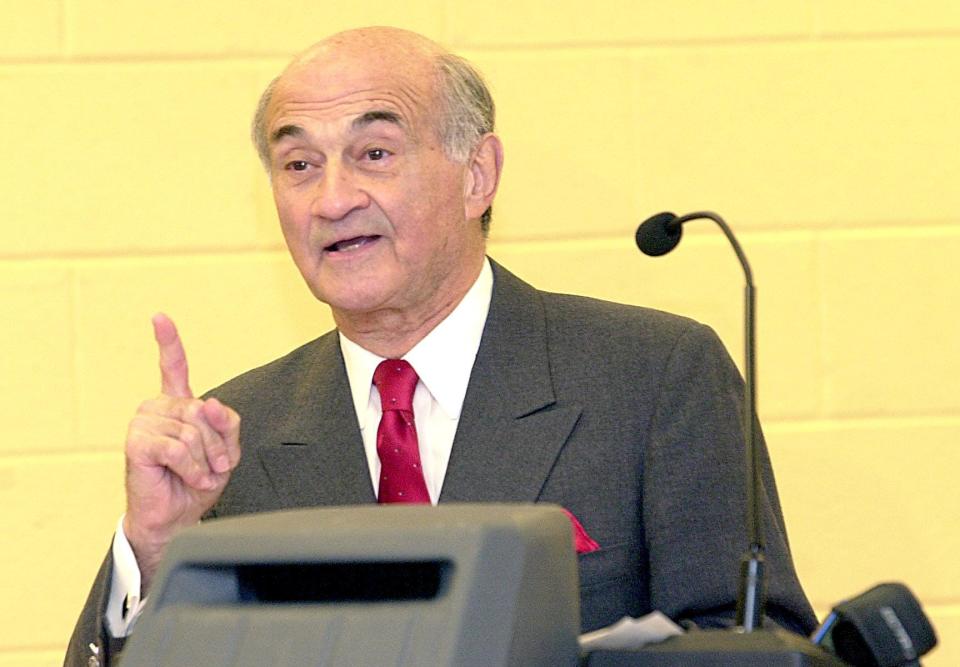A double heart valve surgery by an Erie doctor might earn a Guinness World Record
Mary Ann George had a question for Dr. George D'Angelo, shortly after the groundbreaking Erie heart surgeon replaced two of her heart valves in 1974.
George was only 20 at the time, but her heart had been damaged by a childhood bout of rheumatic fever and a case of septicemia the previous year.
"I wanted to know how long these valves would last," said George, 69, whose last name is now Kozlowski. "He just threw out a timeframe, said '50 years.'"
Fifty years later, Kozlowski still has those mechanical valves in her heart — at least for a little while longer — and Guinness World Records is reviewing whether she is the longest living person who has undergone double-valve replacement.
Dr. D'Angelo, who died in 2014, was a pioneer in cardiac surgery during his 40-year career at Hamot and Saint Vincent Hospital. Among Erie surgeons, his achievements include:
1962 — First open-heart surgery
1964 — First heart valve replacement surgery
1965 — Inserted the first cardiac pacemaker
1969 — First coronary-bypass surgery

More: Here's a look back at an Erie doctor's heart surgery milestones, which began in 1959
Unusual at-home birth led to Kozlowski getting septicemia
Kozlowski became D'Angelo's patient in 1974. She had always had a heart murmur following her battle with rheumatic fever, but then she contracted septicemia during an at-home childbirth.
"I delivered my daughter early," Kozlowski said. "I felt what I thought was a bowel movement, so I went to the bathroom. I actually delivered in the toilet. My mother in law scooped the baby out and gave her mouth-to-mouth resuscitation."
The baby survived but Kozlowski developed septicemia, a blood infection, and spent a month in the hospital. The illness left her heart significantly damaged.
"It got to the point that when I would walk up a hill, I'd get really tired," Kozlowski said. "Another heart doctor sent me to see Dr. D'Angelo, who told me that it was time to schedule me (for surgery)."
The surgery was performed Dec. 3, 1974 at Hamot. D'Angelo replaced Kozlowski's aortic and mitral valves with Bjork Shiley mechanical heart valves.
Surgery helped Kozlowski's heart immediately
Their impact was immediate. Kozlowski's heart pumped blood much more efficiently and she felt more like a typical young mother.
"Each year, I get tested for ejection fracture, to see how my heart was pumping, and get a scan," Kozlowski said.
Kozlowski returned to work, raised her daughter, and eventually remarried and moved to Texas.
Dr. Philip Zinn, Kozlowski's cardiologist in San Antonio, was the person who first mentioned how rare it was to see a patient with two heart valves more than 45 years old.
"We published an article in the Cureus medical journal regarding the longevity of her valves," Zinn said in a letter to UPMC Hamot. "The previous record in the Guinness book of world records for longevity of a double-valve replacement is 31 years at the University of Alabama and we have currently applied to the Guinness book of world records to list Mary Ann as the new record holder."
A spokeswoman for Guinness said it has received the application and is currently reviewing it, a process that takes 12 to 15 weeks.
When a patient needs a heart valve, there are typically two choices: a mechanical valve or one made from pig or cow tissue. Both have their advantages, said Dr. Francis Ferdinand, Hamot's director of cardiac surgery.
"Mechanical heart valves can last a lifetime, though the patient needs to be on the blood thinner Coumadin," Ferdinand said. "Tissue valves typically last 15 to 20 years. The rule of thumb is usually younger patients who need valve replacement get a mechanical valve, while ones in their 70s or 80s get a tissue valve."
Heart valves work well but will soon be removed
Though the valves continue to work properly, Kozlowski hopes to have them removed soon. Other heart problems, connected to her battles with rheumatic fever and septicemia, have developed over the years and she now needs a heart transplant.
"The valves are fine, it's the rest of my heart that is failing," Kozlowski said with a chuckle. "I was put on the transplant waiting list in December."
The fact that Kozlowski is healthy enough to be considered for a heart transplant 50 years after her double-valve replacement is a tribute to both Dr. D'Angelo and the Bjork Shiley valves, Ferdinand said.
"Today's valves are an improvement over the Bjork Shiley valves, but they were revolutionary at the time," Ferdinand said. "They were really a big step up from what was available."
Kozlowski hopes the transplant surgery goes as well as the double-valve repair went 50 years ago. She's been able to live a full life and spend time with her daughter, Katrina Knapp, and her granddaughter, Trinity Knapp.
"I still remember how Dr. D'Angelo would come into my hospital room, grab my hand and ask how I was doing," Kozlowski said. "He just made me smile."
Contact David Bruce at dbruce@timesnews.com. Follow him on X @ETNBruce.
This article originally appeared on Erie Times-News: Erie doctor's heart surgery might set Guinness World Record

